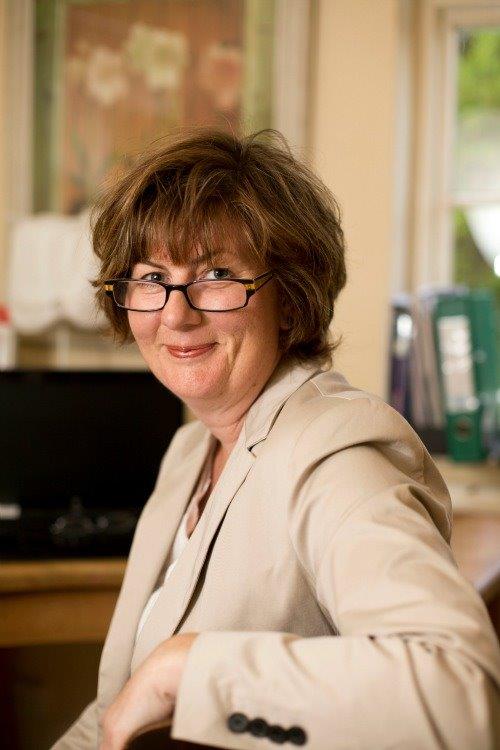AskSARA answers who is using national prevention tool, and why
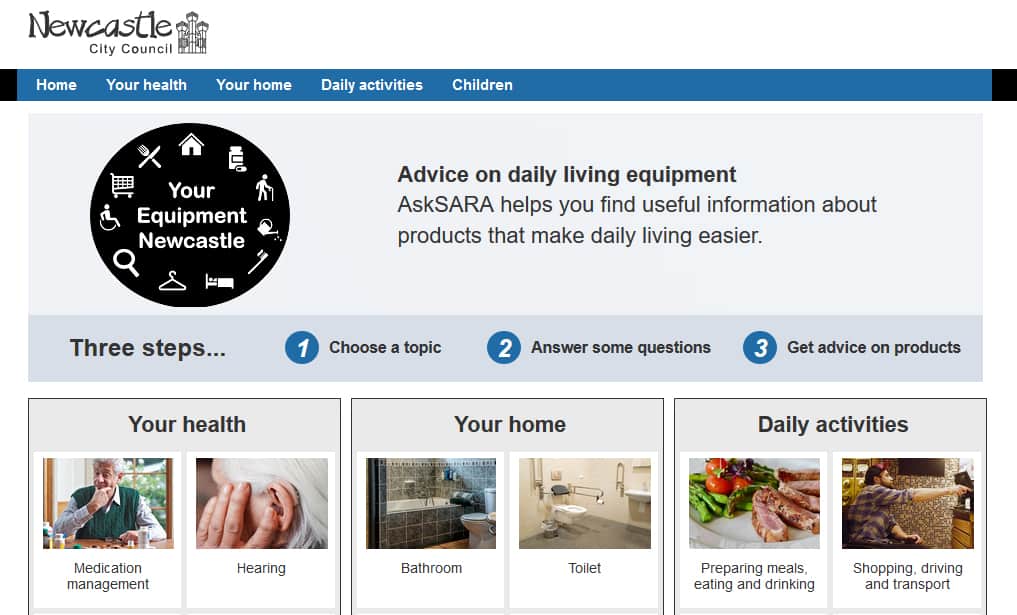
“If only my father/mother/granny/brother/sister knew about that things would have been so much easier…” Variations on this phrase have been relayed thousands of times over DLF’s 50-year history. The lack of awareness of what adaptive equipment and technology is available and where it can be acquired was why DLF was established in 1969. It is also why DLF is still needed today.
It is our aim to reach five million people, by 2022, with our impartial advice, information and training on equipment for daily living.
DLF’s services are mainly online these days, although the telephone helpline remains a staple offering. The Hamiliton Index ring-binders that were a feature on every OT’s desk are now far more accessible online in the shape of DLF Data (by subscription), Living Made Easy and AskSARA (both for the public and free to access). Our knowledge base features over 10,000 products from 950+national suppliers and lists over 800 local retailers.
Originally supported by the Department of Health in 2009, the DLF’s AskSARA online guided advice tool provides ‘self-assessment, rapid access’ (SARA) to help direct older and disabled people to impartial advice about suitable products to help with activities of daily life. Most importantly, it is anonymous and free – factors that DLF believes contribute to its popularity.
The dynamic question streams and resulting advice in AskSARA are devised and revised by occupational therapists and the tool is regulated by The Information Standard https://www.england.nhs.uk/tis/, which gives further assurance of quality.
Who’s using AskSARA, and why?
The AskSARA application is available nationally at https://asksara.dlf.org.uk/ and is also available through licensed versions which provide a more targeted local service. Licensees include around 30 local authorities who add further signposting and advice, directing users to useful resources within their local areas.
The Welsh language AskSARA was launched last September and now covers over 25% of the population.
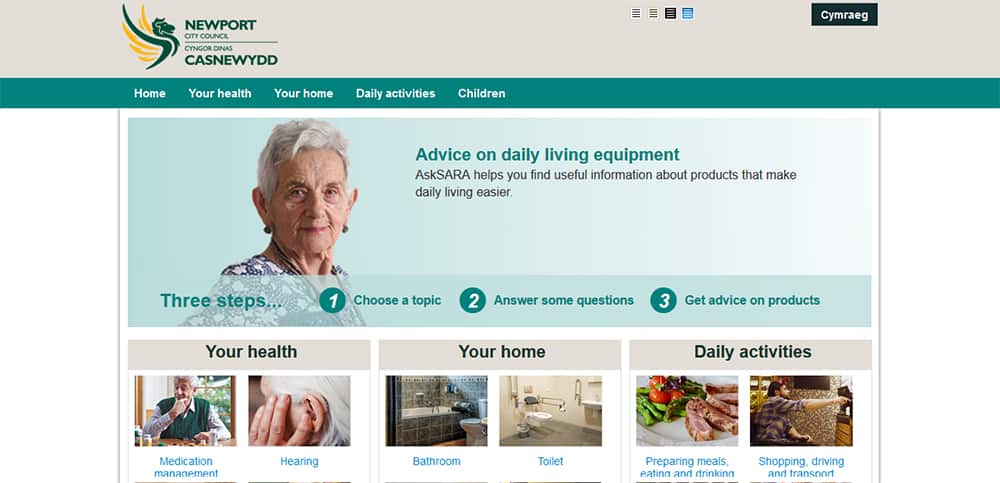
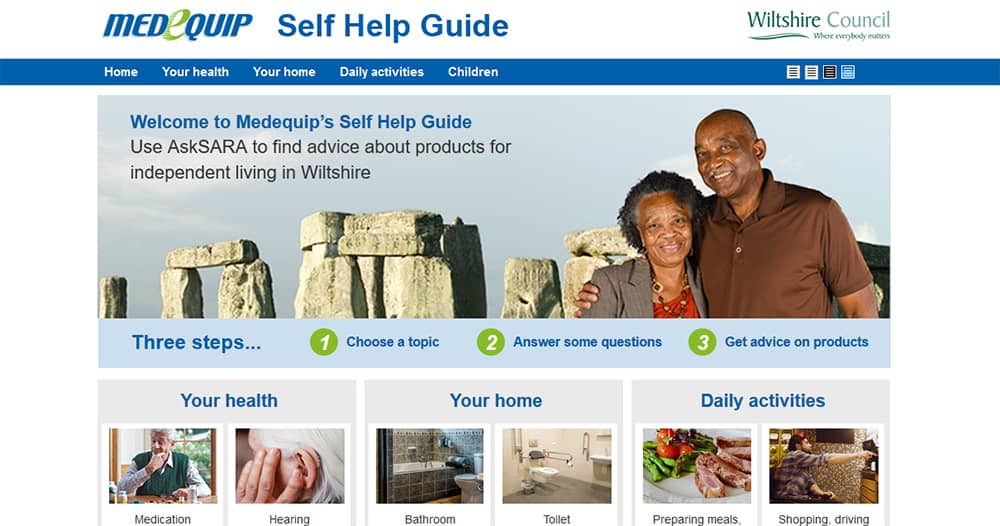
Waiting times for assessments are being stretched and can also differ widely across different localities and services. Councils report that when the tool is offered as a ‘front door’ service, it can help residents quickly find low level solutions for themselves that they are often happy to self-fund. This allows those with more complex needs to access formal assessments more quickly and efficiently. AskSARA’s user analytics can also provide useful pointers for future service development.
DLF’s topics-based analysis is drawn from over 100,000 reports produced by users of AskSARA over a three-year period. Surveys have shown that over 45% of users are searching on behalf of someone else.
Profiling data taken from Google Analytics provides the following profile of users for the year 2018:
- Female 65%
- Over 65s 20%
- Over 55s 40%
- From England 92%
- New users 88%
So far, users have tended to be older women from England and the vast majority are using it for the first time. They select a topic, answer some OT-authored questions about their needs and the combination of answers they provide produces a clear and tailored advice-based report which discusses the types of products they might find useful.
If the user then clicks on the product links, they’re taken to the product and supplier pages in Living Made Easy with over 10,000 products from 950+national suppliers and a list of over 800 local retailers. If the user’s answers suggest areas of greater complexity, they are given clear advice to seek a more formal professional consultation.
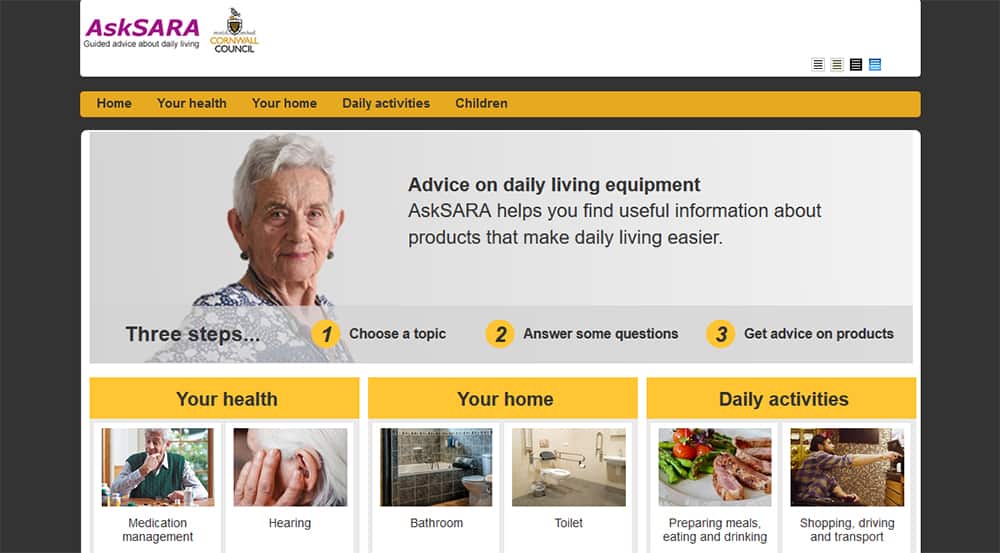
DLF’s analysis examined which topics were most commonly accessed. With over 90 topics to choose from, many were grouped together in order to identify trends more clearly.
A primary finding was that usage was widespread with the top five grouped categories accounting for 35% of reports, but they themselves include 44 separate topics.
Strikingly, the most popular topics cover the essentials of daily living, underlining the importance of products being easily and quickly available to fulfil those needs before they escalate due to accident or neglect.
Top 10 topic areas, as chosen by users of AskSARA (Source: DLF)
| Rank | Topics | 2015-16 | 2016-17 | 2017-18 | |
| 1 | Bathing, Bathroom, Bathroom safety & Showering, Taking a bath, Using a shower, Washing and bathing, Basin | 3400 | 2686 | 3476 | 10% |
| 2 | Drinking, Eating, Eating and drinking, Preparing drinks, Preparing food, Preparing meals and drinks, Opening jars, tins, packages or bottles | 2439 | 2203 | 2342 | 7% |
| 3 | Bedroom, Bedroom furnishings, Bedroom location, Beds, Getting into bed, Getting ready for bed, Getting up at night, Getting up in the morning, Sleeping, Whilst in bed | 2424 | 1932 | 2253 | 7% |
| 4 | Toilet, Toileting, Going to the toilet, Getting to the toilet, Sitting and standing from the toilet, Using the toilet | 1786 | 1457 | 1973 | 6% |
| 5 | Alarms sensors and doorbells, Doorbells, Alarm clocks and smoke alarms, Meters, Telecare and gas detectors, Telecare and smoke alarms, Telecare and temperature extreme alarms, Safety concerns and complaints, Security, Personal safety, Help in emergencies, Living alone | 1971 | 1824 | 1680 | 5% |
As innovations and awareness of the value of telecare increase, it is likely we’ll see more people accessing advice about those areas. Currently, the usage of the tool centres on early generation solutions with ‘help in emergencies’ dominating attention within the category.
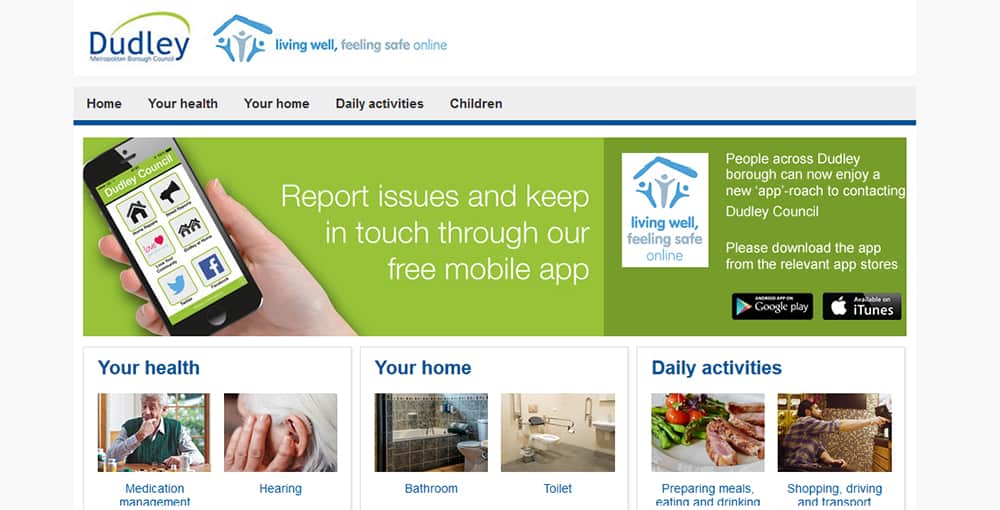
Turning to the next most popular topics, one of DLF’s single most common product areas is medication management, a lower value but nevertheless critical area for maintaining optimum health and safety within the home.
| Rank | Topics | 2015-16 | 2016-17 | 2017-18 | |||||
| 6 | Stairlifts and through-floor lifts, Steps and stairs, Your stairs | 1575 | 1516 | 1583 | |||||
| 7 | Medication management, Taking medication, Medical conditions | 1686 | 1388 | 1482 | |||||
| 8 | Dressing, Clothing and footwear, Getting dressed and ready, Washing and dressing | 1561 | 1291 | 1394 | |||||
| 9 | Chairs, Seating, Sitting and standing, Mobility | 1139 | 1147 | 1104 | |||||
| 10 | Kitchen, Kitchen appliances, Kitchen cupboards, Kitchen lighting, Kitchen worktops and drawers, Safety in the kitchen | 986 | 846 | 999 | |||||
As the list progresses further, we start to see lifestyle-orientated desires, acknowledging people’s desire to maintain their leisure activities. The full list of topics is extensive and shows a range of practical concerns – a powerful reminder of the wide-ranging effects of ageing.
For further information, including access to all the findings from this analysis, please contact DLF at marketing@dlf.org.uk or phone 0207 289 6111.
Future developments
Further development of the AskSARA platform is planned in 2019. New features will include moving to a ‘mobile-first’ design, recognising the growing importance of access from mobile devices. We will also take a fresh approach to the presentation of user reports and introduce new topics – including dementia-related equipment solutions.
DLF has offices in Scotland and Wales and as part of Shaw Trust is registered as a charity in England and Wales 287785 and Scotland SCO39856.


